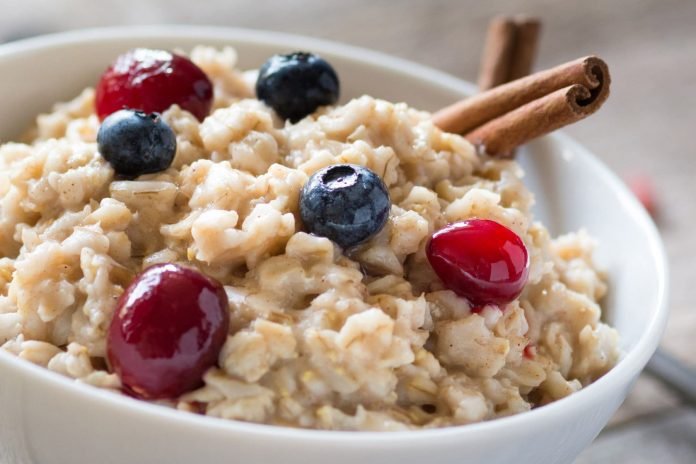Last Updated on March 2, 2024 by Asfa Rasheed
Oatmeal is a nutrient-packed go-to choice for breakfast. A 100 grams of oatmeal contains 68 calories. Out of which 1.4 g is fat, 12 g of carbohydrates, and 2.4 g of protein as macronutrients. Micronutrients include iron, vitamin B6, magnesium. Minerals include sodium and potassium. Carbohydrates in each serving can be lowered by opting for artificial sweeteners or choosing a savory flavor.
Delving deeper into oatmeal’s biochemical composition has helped me understand its several benefits other than maintaining and losing weight. Here are a few upsides of having oatmeal:
Table of Contents
Nervine in Oat Seed is a Natural Anxiolytic
The scientific name of oat is Avena Sativa. Extracted from it has shown significant improvement in mild to moderate anxiety. It is considered a better alternative to benzodiazepines that are usually administered in the clinical setting.
Selenium in Oats is an Effective Antioxidant
Oats are rich in selenium. It enhances the body’s antioxidant effect by conjugating with glutathione peroxidase and Vitamin E. This starts a potent mechanism of effective DNA repair and limits free radicals. Other antioxidants like vitamin E, flavonoids, and phenolic compounds, phytic acid are also found in oats that augment the effect of selenium.
Another study highlighted that oatmeal consumed before high-intensity interval training (HIIT) significantly reduced reactive oxygen species (ROS) in the bloodstream. Samples were collected from the experimental and control group. The latter did not take oatmeal. Thus, the control group had a higher proportion of ROS in the bloodstream. According to this study, oatmeal should be taken pre-workout to optimize its effects.
Melatonin in Oats Promotes Better Sleep
Oats are rich in the amino acid, tryptophan. This is the building block of the peptide hormone, melatonin that is created in the pineal gland. It is commonly used as a sleep supplement. But oats serve as the natural alternative. Having a bowl of oatmeal before bed helps to stay asleep and fall asleep faster. Thus, promoting efficient rest and recovery.
Overall Nutrient Intake
A study showed that consumers eating oatmeal consistently had better overall nutrition and health according to their Healthy Eating Index 2010 scores. They also had lower body weights, normal body mass indices, and leaner waist circumference. Levels of protein, dietary fiber, vitamin A, thiamin, calcium, phosphorus, magnesium, iron, copper, selenium, and potassium were also optimal in these individuals. Thus, the study inferred that eating oatmeal or nutritional bars optimize your overall health and increase awareness of mindful eating.
Beta-Glucan in Oatmeal Prevents Hyper-cholesterolemia
The accumulation of bad lipids, known as low-density lipoproteins, in the blood is directly related to the risk of coronary artery or ischemic heart diseases. Several measures have been proposed to prevent this, one of them includes the addition of oat fiber extracts into your diet. Beta-glucan is an active hypolipidemic component found in oats that have significantly shown a decrease in levels of fats in the blood through scientific randomized clinical trials.
Oatmeal Diet May Improve Glucose Levels in Type 2, Insulin-Resistant Diabetes
In an uncontrolled pilot study, giving an oatmeal diet to type two diabetes patients with severe insulin resistance and metabolic syndrome had a positive effect.
After just two days of an oatmeal diet incorporated in patients admitted to the hospital, a significant decrease was seen in blood glucose and serum leptin. There was an increase in insulin sensitivity that decreased the need for administering exogenous insulin at higher doses. The oatmeal diet was followed in these patients for four weeks outside the hospital and an overall improvement in Glycemic control was noted. Thus, adopting an oatmeal diet may be significantly helpful for diabetic patients.
Should You Take Oatmeal Before Bed?
It is not recommended that you incorporate an oatmeal snack into your diet before sleeping. Most bodybuilders tend to prefer rice cakes with peanut butter or almond butter. Oats are comparatively more nutritious and have a greater amount of dietary fiber but lack the complex carbohydrates found in rice. Thus, there is a possibility that the simple carbohydrates in oats might be replenished until your next meal in the morning. This may drive your body into catabolizing fat or protein stores to expedite energy. To prevent this acute intermittent deprivation and the subsequent switch incorporate one scoop of casein protein powder and one cup of skim milk in your nighttime snack. Moreover, if you have been diagnosed with hyperlipidemia or are prediabetic, a nighttime snack of oats may help regulate the levels of lipids and insulin while you sleep – especially since most lethal coronary events occur during sleep. Thus, oats can serve as a good preventive measure. There isn’t any conclusive scientific research advocating having oats as a compulsory snack before bed – unlike protein shakes whose nutritional benefits as a nighttime snack have been greatly emphasized. Taking oatmeal before bed becomes entirely your choice since it isn’t beneficial or harmful.
Apart from that, if you are interested to know about 3 Cookie Dough Recipes and Ideas then visit Food category.
















